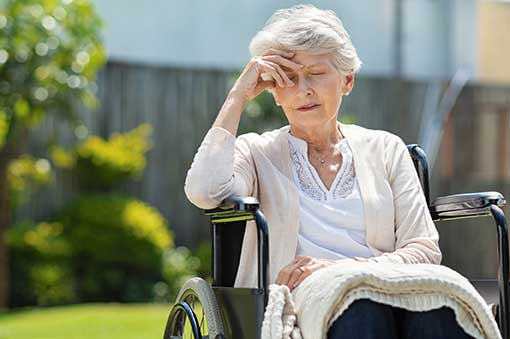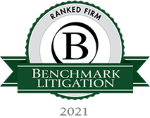Nursing Home Injury Lawyer
Entrusting your loved one to a nursing home is a difficult decision made with the utmost concern and expectations of the facility and staff.
Too often, nursing home residents are neglected and abused by those we entrust to care for them.
Sometimes, the nursing home has not hired enough staff to care for your loved one, and that leads to unsafe standards, injuries, and even death.
Nursing home negligence, neglect, and abuse can cause serious conditions that are difficult to heal in the elderly, including:
- Bedsores
- Fractures
- Bruises
- Malnutrition
- Dehydration
- Diabetic Ketoacidosis
- Infections
If your elder loved one is displaying any of these conditions while in a nursing home or convalescent facility, pay attention.
These could be signs that they are suffering elder abuse or neglect--and you'll need an experienced nursing home injury lawyer.
Nursing Home Lawsuits
Long-term care facilities are liable for negligent and intentional conduct that injures or exacerbates a health condition of a resident.
There are several common theories of nursing home liability when a resident is injured or dies prematurely.
- Negligent hiring
- Negligent supervision of staff and residents
- Medical malpractice
- Neglect
- Failure to maintain premises in a reasonably safe manner
- Failure to maintain adequate safety policies
Sadly, the elderly in convalescent homes are often abused because they are physically vulnerable, isolated from family most of the time, and suffer from natural cognitive decline.
Abuse cases often include additional claims, such as intentional infliction of emotional distress.
Abuse victims are also more likely to be awarded punitive damages than negligence plaintiffs.
Medical conditions in the elderly
Medical conditions that affect the elderly make them more susceptible to abuse and the devastating consequences of negligence and neglect.
Complex health conditions in the elderly are sometimes referred to as geriatric syndromes. Incontinence, frailty, delirium, and pressure ulcers are a few of the symptoms.
Some medical conditions make geriatric syndromes more likely to debilitate older adults, including diabetes, osteoarthritis, chronic obstructive pulmonary disease (COPD), depression, and dementia.
All these geriatric conditions make nursing home residents especially vulnerable to being abused or neglected and to having severe injuries when they are abused.
If your loved one is in assisted living and presents bedsores, unexplained fractures or bruises, frequent falls, or signs of malnourishment or dehydration, they might be suffering from elder abuse, neglect, or negligence.
A nursing home injury lawyer deals with these cases all the time and knows what evidence to look for.
The DLG For Me team represents nursing home injury plaintiffs in all 50 states and will give your loved one the help they need.
Even good people can be tempted to look away from the suffering and abuse the elderly endure because they don’t want to imagine their future selves in that situation.
At DLG For Me, we don’t look away. We thoroughly investigate incidents of elder abuse and nursing home negligence and will fight tirelessly to restore your loved one’s dignity.
If you or a loved one have been injured or became ill in a nursing home, call DLG For Me today for a free and confidential case evaluation.
The statute of limitations will bar your claim, so don’t delay.
Pressure ulcers and bedsores
A pressure ulcer or bedsore is a wound caused by constant pressure on a person’s skin.
These occur most often in hospitals and nursing homes where patients lie in the same position in bed or sit in a wheelchair for long periods of time.
Due to the natural aging process, those in elder care are more likely to have medical conditions that make them susceptible to bedsores.
Patients with certain medical conditions are more likely to develop pressure ulcers.
For example, diabetes can make a patient more likely to develop bedsores because the disease affects blood circulation.
Patients who are immobile and incontinent are also at high risk for bedsores.
Some pressure ulcers are unavoidable, but usually with proper care they can be avoided or, at the very least, healed.
Nursing homes know the threat of bedsores to their patients and are expected to prevent them by helping residents change positions frequently, keeping residents nourished, hydrated, and dry, and monitoring emerging bedsores to ensure they heal.
Falls, fractures, and bruises
Fractures and bruises are a part of life, but when a resident in elder care suffers from frequent fractures and bruises, this could be a sign that they are suffering from abuse that they cannot clearly communicate to their loved ones.
Frequent falls could also indicate that the nursing home is neglecting the patient or failing to provide an environment that is easy for those with mobility issues to navigate safely.
If you notice an unexplained injury like a broken bone or bruises around the genitals, or if the patient refuses to talk about what happened, you should take further steps to protect them, call 911 if they need treatment, and call a lawyer to investigate your claim.
Malnutrition and dehydration
Malnutrition and dehydration are common in nursing home neglect cases.
If you notice sudden weight loss or other signs of malnutrition and dehydration, it could be a sign that your loved one is suffering from neglect or abuse.
Nursing home neglect
Neglect occurs when nursing home staff fails to care for wounds, provide a clean and safe environment, or give residents enough food and water.
We often think of nursing home injuries arising from medical neglect, such as failing to care for bedsores or allowing elderly residents to fall and not caring for the resulting injuries.
These cases are extremely serious and can rise to the level of medical malpractice.
Just as common, the nursing home neglects the patient’s daily needs like eating, drinking, exercise, and going to the bathroom.
While one or two instances of this type of neglect might not seem alarming, over time it can lead to dangerous dehydration or malnutrition.
Similarly, hygiene neglect might seem like a minor concern, but improper hygiene can contribute to dangerous conditions like bedsores and reflect an overall pattern of negligent caretaking.
Elder abuse
Every day nursing home residents are sexually, physically, emotionally, and financially abused.
If you have a loved one in a resident care facility, keep an eye out for signs of abuse.
According to the National Center on Elder Abuse (NCEA), the main risks for elder abuse are social isolation; lack of access to support and resources; and physical, mental, or emotional dependence.
NCEA also reports high levels of institutional abuse.
According to a recent systematic review of self-reports, it found that 33% of residents reported psychological abuse, 14% reported physical abuse, and 11% reported neglect.
It also notes significant underreporting, with an estimated 24 undetected abuse cases for every single reported incident.
If you suspect elder abuse, trust your instincts.
You don’t have to prove abuse is occurring to file a report.
When in doubt, call DLG For Me and speak with a nursing home injury lawyer experienced in nursing home injury lawsuits for guidance on your best options.
Signs of elder abuse
As people age, they become more reliant on others to care for them, which unfortunately makes them vulnerable to abuse and neglect.
The signs of abuse can be difficult to distinguish from the natural decline of the aging process.
The National Institute on Aging and U.S. Department of Justice recommend watching for these signs of elder abuse:
- Depression, confusion, or withdrawal
- Isolation from friends and family
- Unexplained bruises, burns, scars, or rope marks
- Dirty, underfed, or dehydrated appearance
- Lack of appropriate medical care or medications
- Bedsores or frequent falls
- Untreated injuries in various stages of healing
- Unexplained genital infections
- Broken eyeglasses
- Recent banking or spending changes
- Sudden changes in a will or estate planning documents
- Caregiver refusal to allow visitors alone with the patient
- Personality changes such as apologizing or crying excessively
If you recognize any of these signs in your loved one living in long-term care, they need help.
Seek medical care if they are injured and call a lawyer for advice.
Nursing home abuse lawyers deal with these cases all the time and know what evidence to look for.
The DLG For Me team represents nursing home injury plaintiffs in all 50 states and will give your loved one the help they need.
Nursing home injury damages
The compensation available in a nursing home injury lawsuit depends on the state where the injury occurred and the claims you make against the defendant.
Successful nursing home injury lawsuits usually get compensatory damages that include:
- Medical bills
- Pain and suffering
- Mental anguish
- Emotional distress
Because the plaintiff in an elder abuse case is likely retired or otherwise unable to work, lost wages are not often included in the damages award.
In cases where the defendant’s conduct was especially reckless or callous, courts sometimes award punitive damages meant to punish the defendant and deter others from behaving similarly in the future.
The statute of limitations for nursing home injuries
The statute of limitations is the legal term for the deadline to file your case.
Statutes of limitation in nursing home cases vary from one to six years, depending on the state.
Calculating the deadline to file your claim is complicated by varying factors.
For example, some states recognize the discovery rule, which prevents the statute of limitations from running on your claim until you discover the injury, and do not simply rely on the date the injury occurred.
The incapacity of the victim can also delay the deadline to file, depending on state law.
If you or a loved one were injured by nursing home negligence, abuse, or neglect, your best option is to speak with a lawyer experienced in nursing home litigation.
The compassionate attorneys at DLG For Me represent plaintiffs nationwide and will help you get the answers you need to make things right for your elder family member.
If you suspect your loved one is suffering from negligence, abuse, or neglect in their long-term care facility, call today for a free consultation because the time to file a lawsuit and get compensation is strictly limited.
The following article will teach you more about nursing home care in the US, as well as how your DLG For Me Nursing Home Injury Lawyer can assist you.

$500 Million+
Won in 2020 Alone
Free Nursing Home Injuries Case Review
Top-Rated & Reviewed
DLG For Me Awards and Recognition





